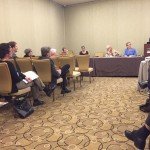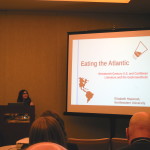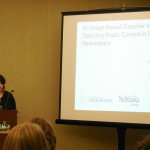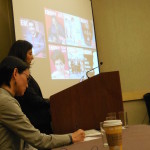Here’s a list of papers and panels at ALA that are not sponsored by RSAP, but nevertheless of interest to periodicals scholars. Please contact us if you are presenting a paper that we should include in this list!
And be sure to check out RSAP-sponsored panels and events here.
Session 2-B Reimagining Young Willa Cather: New Evidence, New Approaches
1. “Cather’s 1897 ‘Prize Question’ Contest for the National Stockman and Farmer: or, What ‘Our Young Folks’ Need to Know,” Timothy Bintrim, St. Francis University
Session 3-A The Citizen Poets of Boston, 1789–1820
1. “Recovering the Citizen Poets of Boston: Pedagogy, Research, and Findings,” Paul Lewis, Boston College
2. “Feminist Voices in the Citizen Poets Anthology,” Alexandra Mitropoulos, Boston College School of Law
3. “Reprinting as Revision: The Version of Joseph Fawcett’s ‘Contrast’ (1798) that Appeared in
the Christian Disciple in 1816,” Nicholas Volpe, Boston College
4. “Local Forms, National Concerns: Populist Archives of Boston’s Early Republic,” Kristin Canfield, University of Texas at Austin
Session 4-D Defining Genres in Early African American Literature
1. “Circulating the Black Rapist: Sketches of the Life of Joseph Mountain and Early American Networks of Print,” Brian Baaki, CUNY Graduate Center
2. “At War with Genre: The Context and Construction of the Civil War in Julia C. Collins’s The Curse of Caste or; The Slave Bride,” Eric Van Hoose, University of Cincinnati
3. “Anonymous Circulations: Unnamed Southern Correspondents for Freedom’s Journal and The Rights of All,” Gordon Fraser, University of Connecticut
4. “The Place of the Conjurer: Genre, William Wells Brown, and the Conjure Tale,” Sarah Ingle, University of Virginia
Session 4-F Issues of Celebrity
3. “Paul Gray, Time Magazine, and American Literary Culture in the Late Twentieth Century,” Frank Novak, Pepperdine University
Session 5-B Emergence and Influence of Literary Criticism in Antebellum America
1. “Prison Reform and Interiority in Reviews of Antebellum American Fiction,” Carl Ostrowski, Middle Tennessee State University
2. “Critical Fictions: Melville’s Pierre and Antebellum Critical Culture,” Adam Gordon, Whitman College
3. “Cross-Racial Labor Reform: Literary Notices of Cheap Fiction in Frederick Douglass’ Paper,” Timothy Helwig, Western Illinois University
Session 5-O Literary Business and Finance
3. “Advertising Black Entrepreneurial Uplift in The Crisis,” Adam Coombs, Indiana University
Session 7-E Print Cultures within the Nation
1. “‘[C]haracteristic of the American Mind’: 19th Century Humor, Satire, and National Identity,” Todd Nathan Thompson, Indiana University of Pennsylvania
2. “‘The Honest, Home-Write Page’: The Search for the Early American Comic Strip,” Alex J. Beringer, University of Montevallo
3. “Forming Community through Print: Bill Nye in the Pittsburg Dispatch,” Brianne Jaquette, University of Missouri
Session 8-C Celebrating Twenty Years of the Woolson Society with New Perspectives on Her Life and Work
2. “Trial by Newspaper: Murder and Invention in Woolson’s Anne,” Kathleen Diffley, University of Iowa
Session 8-H Ezra Pound Society, Session 2: New Trends in Ezra Pound Studies
1. “Ezra and Gino in the Indice, 1930-31,” Wayne Pounds, Aoyama Gakuin University, Tokyo, Japan
Session 9-G Elizabeth Bishop and Marianne Moore
3. “Marianne Moore in Transatlantic Modernist Magazines,” Celena E. Kusch, University of South Carolina Upstate
Session 10-B Roundtable on Dreiser and Gender 2015: Flash Talks
3. “‘The Realist and his/her Sources’: Gendered Authorship and Readership in Dreiser’s Late Literary Criticism,” Carol Smith, University of Winchester
Session 11-F Comics and Modernism
1. “Cartoonists Greet the Future: Comics, the Armory Show, and the Shock of Recognition,” Peter R. Sattler, Lakeland College
2. “The Invisibility of Influence: The Poetics of George Herriman’s Krazy Kat and the Comicity of E.E. Cummings,” Ben Novotny Owen, Ohio State University
3. “Beyond Black: Abstraction and Expression in the Comics and Canvases of Ad Reinhardt,” David M. Ball, Princeton University
Session 11-G Issues of Social Justice
1. “Shadow Mayors of Harlem: Umbra’s New York Avant-Garde,” Keith D. Leonard, American University
2. “Re-Viewing Chinatown: Countering Anti-Chinese Stereotypes in the 1880s Illustrated Press,” Amanda Frisken, SUNY College at Old Westbury
4. “Upton Sinclair’s Pulp Didacticism,” Andrew Smart, The Ohio State University
Session 15-A Mark Twain’s Audiences: Reception Histories and Reconstructed Reading Communities
1. “Reconstructing the Reading Community of the Century: The Pre-Published Chapters of Huckleberry Finn,” Barbara Hochman, Ben-Gurion University of the Negev
3. “The Reception of The Prince and the Pauper in the Early 1880s,” James L. Machor, Kansas State University
Session 15-F Crime, Mystery, and Detective Fiction
1. “‘Not Being A Female’: Singular Images of Female Criminals in the Antebellum Press,” Nicole C. Livengood, Marietta College
Session 16-A Melville’s Money
2. “‘The Universal Confounding and Distorting of Things’: Money and Poverty in Melville’s Magazine Pieces,” Madison Furrh, Colorado State University-Pueblo
3. “Dead Letters Circulated: ‘Bartleby’ in an Age of Communications Revolution,” Yoshiaki Furui, Emory University
Session 17-G Roundtable on Pauline Elizabeth Hopkins’ Of One Blood
4. “Distributed Agency among Pauline Hopkins, the Colored American Magazine, and Of One Blood,” Michelle N. Huang, The Pennsylvania State University
Session 18-E Form and Expectation in Early American Literature
5. “Expectation and Plebeian Blindness in Late Eighteenth-Century Newspapers and Jestbooks,” Jennifer Thorn, St. Anselm College
Session 18-G Depictions of Women in the 19th Century Press
2. “Deferring for the Ladies: Narrative Beginnings and Sarah Hale’s the Ladies’ Magazine,” Lydia G. Fash, Boston University
Session 21-H Women’s Roles Revisited
3. “‘And why should not four women make up a party to go and learn from the lips of the sages?’: The Woman’s Journal and Women’s Pilgrimage to Concord, Massachusetts,” Todd Richardson, University of Texas of the Permian Basin



